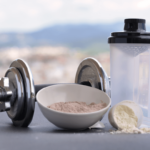If you’re trying to shed a few pounds or get the perfect beach bod, gaining weight after lifting weights may not be ideal. But don’t throw in the towel or swear off the gym just yet.
This is a common occurrence with straightforward causes and solutions. Let’s look at everything you need to know to understand weight gain after lifting weights.
Jump to:
Is Weight Gain After Lifting Weights Normal?
Let’s start with the most likely question on your mind, “Is this normal?”
Yes, a slight increase in weight after lifting weights is normal. Even if your goal is shedding a few pounds, you might notice fluctuations on the scale as you start your new exercise regimen.
Don’t feel discouraged; this is normal and part of the weight loss journey. But what causes weight gain after hitting the gym?
What Causes Weight Gain After Lifting Weights?
So, you started a new exercise program with weight loss in mind. You’re getting intense workouts, with strength training and cardio sessions. But when you step on the scale, you weigh more than when you started—what gives?
Although frustrating and disheartening, post-workout weight gain is a common occurrence.
The source of weight gain is typically water retention, muscle mass gain, and muscle fiber inflammation. Let’s look at these common culprits in more detail.
Water Retention
Water retention is a common cause of temporary weight gain. Water weight is any extra water stored in the body. When it’s not caused by severe health complications, it can cause bloating in the abdomen, puffiness, and weight fluctuations.
Water weight gain can cause your body weight to fluctuate by 2–4 pounds over the course of a day. Excessive sodium intake, menstrual changes, sitting too long, certain medications, and health conditions can also contribute to water weight gain.
This is why it’s recommended to weigh yourself at a consistent period of time every day, usually first thing in the morning. Stepping on the scale right when you wake up accounts for digestion and other variables, providing you with a more accurate reading.
Post-Workout Inflammation
Your workout routine may be the cause of temporary weight gain. Don’t panic—-this is a good thing, and you’re putting in enough effort to yield results.
Weight training and cardio cause minor damage to muscle tissues. The stress from exercise causes micro tears in the muscle cells. It’s completely ordinary and necessary for building muscle mass.
But the damage to the cells in muscle tissue (myofibers) causes a build-up of white blood cells, resulting in inflammation. This is known as exercise-induced muscle damage (EIMD) and can show up as temporary weight gain.
You’ll know you’re experiencing EIMD if you have delayed-onset muscle soreness or DOMS for short. You’ll likely feel sore for 1–3 days after your exercise routine as your body begins the healing process.
Carbohydrates
Carbohydrates from food and drinks can also cause a temporary increase in weight gain. Physical activity depletes the body of glycogen, the body’s preferred and primary source of fuel.

Consuming carbohydrates restores muscle glycogen, but the body stores three grams of water for every gram of glycogen. This can cause temporary water weight gain and a bump in scale weight.
However, this is a completely normal process and won’t affect your weight loss goals. Weighing yourself first thing in the morning can help you avoid fluctuations on the scale and keep you motivated.
You’re Building Muscle Mass
A slight increase in weight can be a good sign—you’re likely developing more lean muscle mass. Most weight lifting and exercise programs will cause some gain in lean muscle mass.
The amount of muscle you’ll gain will depend on your daily diet, lifestyle habits, and strength training program.
It’s also possible to see an increase in weight even if you’re losing body fat. A pound of muscle is the same as a pound of fat, but it’s more dense. The dense muscle mass takes up less space, meaning you can trim inches with an increase on the scale.
That said, these changes in body composition won’t happen immediately and will occur in a couple of weeks or months.
What You Can Do About Weight Gain After Lifting Weights
Post-workout weight gain is frustrating and disheartening, especially when trying to cut your body fat percentage. But it doesn’t mean you have to give up on your goals.
There are a few adjustments you can make and tips to keep in mind to stay on top of your weight loss goals.
Don’t Confuse Muscle Gain With Fat Gain
Chances are, you’ll gain a bit of lean body weight with regular weight training. This is a good thing—you’ll be fitter, stronger, and have a better body composition.
The downside?
The weight on the scale might go up. Don’t be discouraged by a slight uptick on the scale. You may be getting stronger and building larger muscles. A standard body weight scale won’t measure these differences.
You can use a body fat monitor with bioelectrical impedance to get a more accurate measurement. You can also take measurements of your waist, hips, thighs, and arms to see if you’re losing inches.
Don’t Expect Immediate Results
Fast results are a common weight training myth. Whether your goal is losing 15 pounds or gaining 10 pounds of muscle, it will take some time. Many people hit the gym once and step on the scale expecting a significant change.
But this isn’t the case. Progress isn’t a movie montage, TikTok clip, or social media post. Losing weight can take a couple of months and requires dedication, consistency, and grit.
Instead, remember that the process takes time. If you’re data-driven, you can calculate your calories and weight-loss numbers to determine the exact timeframe. Otherwise, stay consistent and focus on the journey.
Don’t Focus On Just the Scale
One of the biggest weight loss mistakes is focusing solely on the scale. Yes, it’s important to weigh yourself frequently and on a consistent basis. But there are more meaningful ways to track your progress.

The scale provides a data point you can use to determine if you’re on the right track. But it doesn’t tell you everything about health improvements. Ask yourself some of the following questions:
- Do my clothes fit better?
- Do I have more energy?
- Are my workouts improving?
- Am I more flexible?
- Is my mood improving?
- Is my sleep getting better?
These questions can seem trivial when you aren’t meeting your expectations, but they can help you gauge your progress toward a more fulfilling life.
Having more energy, improved sleep quality, and feeling better emotionally can be a dramatic improvement.
But if you’re data-driven, you can use additional health markers like resting heart rate, blood pressure, waist circumference, or triglycerides. Using more measurements will help you get a holistic view of how your health is improving.
Pay Attention to Diet
There are practical measures you can take besides mindset shifts. It’s critical to pay attention to your diet if you’re trying to lose weight. The basis of losing weight revolves around calorie intake—you have to burn more calories than you consume.
Counting calories and macronutrients doesn’t work for everyone. But it’s important to consider your daily food intake. Are you eating healthy snacks? What are your water intake and portion sizes?
If you have been hitting the gym for some time and keep gaining weight, it may be time to address your diet.
Frequently Asked Questions (FAQ)
Why Do You Weigh More After Lifting Weights?
You may weigh more right after lifting weights because of the healing process. The body retains more fluid in the muscles, which contributes to water retention and weight gain. It’s better to weigh yourself first thing in the morning for the most accurate measurements.
Why Am I Gaining Weight When I’m Eating Less and Working Out?
You may weigh more when working out and eat less due to muscle gain. If you weigh yourself at different times of the day, you may also notice fluctuations. You can use a body fat scale or body measurements for a better representation of your progress.
How Can I Tell If I’m Gaining Muscle or Fat?
For a more accurate measurement, you can use a body fat scale or monitor to determine if you’re gaining muscle or fat. Otherwise, look for improvements in strength, cardio, and body measurements.














